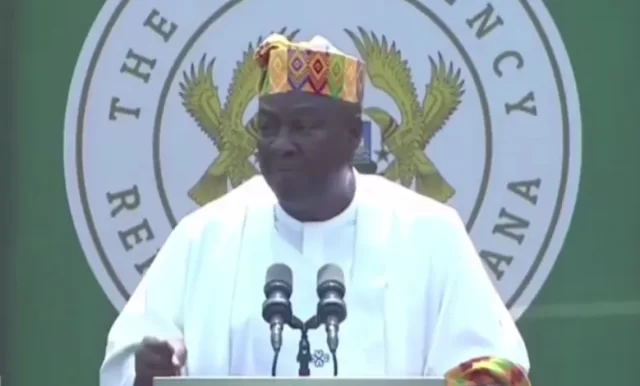President John Dramani Mahama has commenced his second term in office with a bold commitment to restore Ghana’s ailing economy, foster business growth, and overhaul the country’s governance systems.
In his inaugural speech on January 7, 2025, Mahama outlined a comprehensive vision to stabilize the nation’s finances, tackle corruption, and implement constitutional reforms to meet the aspirations of the Ghanaian people.
During the ceremony, Mahama addressed the pressing economic issues facing the nation, including rising debt and inflation. With Ghana’s public debt soaring, Mahama made it clear that economic stabilization would be his foremost priority. He highlighted the need to renegotiate the country’s agreement with the International Monetary Fund (IMF) to ease strict fiscal conditions, which many argue have limited the government’s ability to stimulate economic growth and social development. The President is also focused on overhauling the country’s tax system, seeking to make it more transparent and equitable to encourage entrepreneurship and innovation.
“We must have faith in our institutions, and a reset in our faith in Ghana,” Mahama declared, as he called for national unity and collective effort in overcoming the country’s current difficulties. His message was one of hope, despite the serious challenges at hand, stressing that every Ghanaian had a role to play in the nation’s transformation.
Energy challenges were also central to Mahama’s address. Ghana’s energy sector, in particular, faces a critical debt of US$1.5 billion owed to independent power producers (IPPs). Failure to address this issue could lead to a return of the dreaded ‘Dumsor’ power outages, which severely disrupted the country’s economy in the past. Mahama has committed to finding sustainable solutions, emphasizing the importance of working with the IPPs to resolve the sector’s financial instability. Additionally, his government aims to increase investment in renewable energy, signaling a longer-term shift toward sustainable power generation.
Alongside these immediate priorities, Mahama also emphasized the importance of fiscal prudence. He pledged to run a lean government, which would serve as a measure to restore investor confidence and reduce unnecessary government expenditure. Such measures are seen as crucial for attracting both foreign and domestic investments into critical sectors such as health, education, and infrastructure, which are seen as key to the nation’s long-term growth.
Another central theme of Mahama’s speech was the vision of a 24-hour economy powered by agriculture and technology. The President’s aspiration is to create an economy that never sleeps, with a dynamic workforce and responsive public services accessible at all times. This vision, he stated, would provide opportunities for Ghana’s youth, helping them fulfill their potential and contributing to the broader economic growth of the country.
As Mahama seeks to bolster Ghana’s position on the global stage, he also stressed the need for the nation to adapt to changing global economic dynamics. He pointed to the diminishing dominance of the G7 nations and the rise of the BRICS countries, urging Ghana to position itself strategically in this shifting geopolitical landscape. Mahama’s government, he said, would work to ensure that Ghana takes full advantage of these emerging opportunities, especially in areas such as trade and investment.
Another noteworthy aspect of Mahama’s speech was his call for regional cooperation, particularly with Nigeria, a key partner in West Africa. Nigerian President Bola Tinubu, who attended the inauguration, expressed strong support for Mahama’s leadership, reaffirming the importance of peace and dialogue between the two nations. Tinubu, in his address, emphasized the historical and economic ties between the two countries, pledging Nigeria’s assistance in helping Ghana navigate its current challenges. This show of solidarity comes at a time when both nations are facing similar economic hurdles, and the commitment to working together could lay the groundwork for more robust cooperation on regional issues, including security, trade, and infrastructure development.
As Mahama settles into office, all eyes will be on how he delivers on his promises to revitalize Ghana’s economy and political systems. His remarks resonate with optimism, yet the reality of economic reform and crisis management will require sustained action and collaboration across the political spectrum. The challenges are significant, but Mahama’s second term provides an opportunity to steer the country back on course—if he can successfully balance economic reforms with addressing the social needs of his people.
While Mahama faces an uphill battle, the clear sense of purpose and vision he articulated on January 7 offers a glimpse of hope. He has already set the tone for his term—decisive action, accountability, and governance reforms will be crucial if he is to deliver on his pledge to improve the lives of Ghanaians and restore the nation’s economic standing. Whether Mahama’s ambitious plans will succeed largely depends on his ability to implement these reforms amidst global economic uncertainty and internal fiscal challenges.
It is, however, evident that the road ahead for Ghana will require the collaboration of its citizens, its leaders, and its regional neighbors to unlock its full potential and face the coming challenges head-on.
Send your news stories to newsghana101@gmail.com
Follow News Ghana on Google News










![Mr Logic signs two dancehall artistes unto his Red Panther record label [Video]](https://ghananewss.com/storage/2023/05/Mr-Logic-signs--100x75.jpeg)







